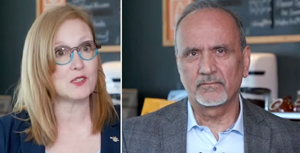Monday June 5, 2023 | VICTORIA, BC
by Mary P Brooke | Island Social Trends
The minimum wage in BC is now $16.75 per hour.
That went into effect June 1, 2023.
That makes BC’s pay floor for workers in this province the highest provincial minimum wage in Canada. Over 150,000 British Columbians are benefitting from this increase, says the provincial government.
With the surging upswing of inflation over the past 14 months and the resultant upward push on the cost of living, few people can get by on an income based entirely on minimum wage. But increasing the minimum is heading in the right direction to assist with affordability for low-income earners.

The increase was notable at $1.10 more per hour — from the previous $15.65 to now $16.75 per hour.
The first formal announcement of the minimum wage increase was held back on April 5 in Victoria, delivered by Minister of Labour Harry Bains and Minister of Jobs, Economic Development and Innovation Brenda Bailey, at a coffee shop in Victoria.
At that time, the BC Chamber of Commerce said it is “extremely disappointed” with their provincial government’s decision to increase the minimum wage, arguing it’s “the wrong choice, at the wrong time.”
Meanwhile BC Federation of Labour President Sussanne Skidmore said the wage hike was “much−needed”, pointing out that BC is one of the most expensive provinces in Canada.
Beyond retail and hospitality:
Minimum wage work is often in retail and hospitality — places like stores and restaurants where consumers hope for good service.
Many minimum wage workers are entry-level young workers as well as older workers hoping to make ends meet.
The 6.9% increase on Thursday, June 1, 2023, also applies to minimum-wage rates for resident caretakers, live-in home-support workers and live-in camp leaders.
On Jan. 1, 2024, piece rates for the hand-harvesting of the 15 crops specified in the Employment Standards Regulation will increase by the same percentage.
Predictability for businesses:
Government says that its regular, gradual increases to the minimum wage provide certainty for workers and predictability for businesses.
Impact of AI:
The onslaught of artificial intelligence into the consumer interface could change the fate of minimum wage workers in the years ahead.
Tying to inflation:
This is the second year that the adjustment reflects government’s commitment to tie annual minimum-wage increases to inflation.
Options are being developed to continue to fulfil government’s commitment to tie minimum wage to inflation for future years.
In 2022, B.C. increased the minimum wage by 2.8%, which was the increase in the cost of living in the province in 2021.
Ahead of the pack:
At least eight other jurisdictions also base their minimum-wage increases on annual changes to Consumer Price Indexes. Most jurisdictions in Canada are increasing their minimum wage this year, except Alberta and Nunavut.
The Government of Canada announced an increase to the minimum wage for federally regulated employees from $15.55 to $16.65 as of April 1, 2023.
BC minimum wage over the years:
The hourly minimum wage in British Columbia has doubled in the last 22 years. In several of those years under the former BC Liberal government there were no increases (2002-2010, 2013 and 2014).
The NDP government since 2017 has moved the minimum wage up in line with getting closer to a living wage. Here is the profile for 2001 to 2023:
21st Century BC Minimum Wage (per hour) – 2001 to 2023
- First decade: 2001: $8.00 | 2002-2010: no increases [note: financial crash/recession in 2008/09 for which recovery took several years]
- Second decade: 2011: $8.75, then $9.50 | 2012: $10.25 | 2013 & 2014: no increase | 2015: $10.45 | 2016: $10.85 | 2017: $11.35 | 2018: $12.65 | 2019: $13.85
- Third decade: 2020: $14.60 | 2021: $15.20 | 2022: $15.65 | June 1, 2023: $16.75
===== RELATED:
BC minimum wage rising to $16.75 at June 1 (April 5, 2023)
BC now has highest minimum wage in Canada (May 31, 2022)







